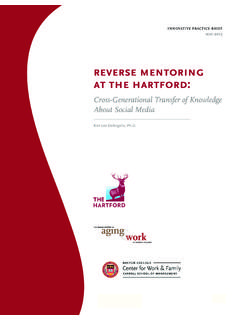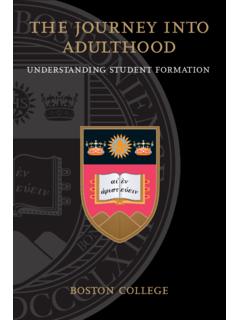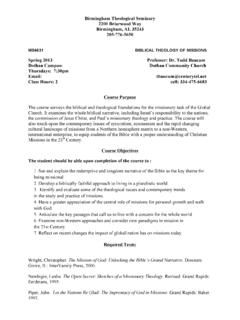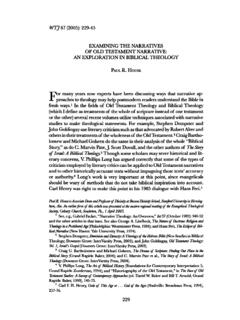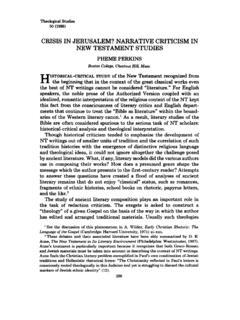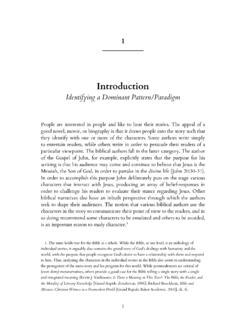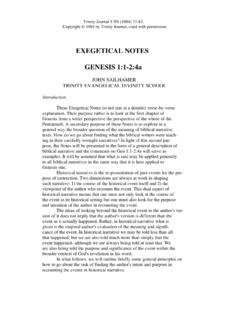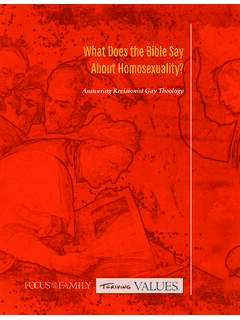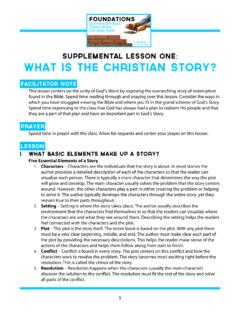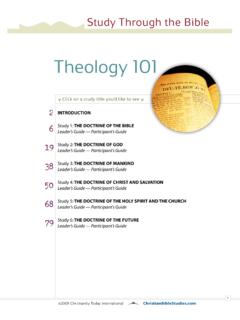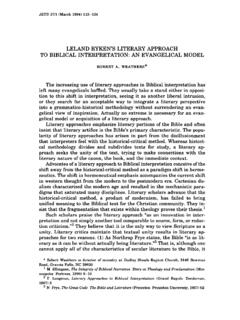Transcription of “Justice in the Bible” - Boston College Home Page
1 justice in the bible BY RICHARD J. CLIFFORD, Published in Jesuit Education 21: Conference Proceeding on the Future of Jesuit Higher Education. Martin R. Tripole, , Ed. (Philadelphia: Saint Joseph's University Press, 2000). All rights reserved. Used with permission of St. Joseph's University Press. It is a pleasure to take part in a symposium that takes seriously the bible including the Old Testament / Hebrew Scriptures. I want to thank Father Fitzmyer for his thorough analysis of the vocabulary of justice in the bible and in the translations that served as official texts in the Latin Church and the Greek Orthodox Church.
2 I have little to add to his treatment, and will strike out instead on a less lexical and more impressionistic path. I will be speaking mostly about social justice , that is, justice among human beings, especially the members of the holy justice in the bible , all agree, is relational--how a thing, act, or person relates to a standard of justice , in this case God. In biblical religion there is no order or fate beyond God to which things conform; Yahweh, the Most High, is the standard of justice and those properly related to God become I will talk about three major "founding moments" in the bible , for in them the standard of divine justice is especially clear: the origin of the world in Genesis 1-11, the origin of Israel in the Book of Exodus, and the origin of New Israel in the Gospels.
3 Origins were important in the ancient Near East and in the bible , for it was then that the imprint and purpose of the Creator was freshest and most visible. Ancient authors used cosmogonies and stories of origin to explore the purposes of God or the gods; such stories were the philosophy and theology of the time. Those ages did not have our discursive essay ( narrative was for them the vehicle of serious thought) nor did they assume historical development from simple to complex. The world was given whole and entire at the beginning.
4 To know the origin o f something was, in some sense, to know its essence. Boston College -- Office of University Mission and First Founding Moment: Genesis 1--11 Genesis 1-11, it is widely agreed, consists of two cosmogonies ( 2-11). The first (the familiar seven-day creation account) is also an introduction, providing a lens for viewing the second creation account (cc. 2-11). The whole section, despite its deft treatment of human psychology, is profoundly theocentric, highlighting two aspects of God that are indispensable for understanding biblical justice : God is generous and God is just.
5 I will say a word about each aspect. God Is Generous In the seven-day creation account in Genesis 1, God's generosity finds expression in the two defining imperatives given to the human race in 1:28: (1) be fertile and multiply; (2) fill the earth and subdue it. The chapters that follow tell how human beings fulfill these imperatives: they "multiply" (the genealogies with their famous "begats" in cc. 4, 5, and 11) and they "fill" the earth and subdue it" as they move out to their diverse lands and take possession of them ( ).
6 In other words, human beings are commanded to participate in the rhythms of the good universe, a point that is very clear with regard to land. Parenthetically, the command "Subdue [ the earth ]" does not command people to exploit the earth but to take possession of the territory God has given them. In Genesis 10, each of the seventy nations is to have its own land. Later, when Israel takes its own land, the prophets insist that every Israelite family have its land over which God alone has God intends that people enjoy and be satisfied with the bounty of creation; be sated is a favorite verb in the Bible4 as in Ps 22:26, "The poor shall eat and be satisfied.
7 " The prophets condemn land grabbing as rebellion against God's generous will that all members of the Israelite community be sated. Woe to those whose greed keeps others from enjoying what God has given to all. God Is Just The same chapters show God acting justly, affirming righteous behavior ( , rescuing Noah) and frustrating wicked behavior (Adam and Eve, Cain, Lamech, etc.). God is not Boston College -- Office of University Mission and or volatile like the gods in comparable literatures, but responds predictably (albeit mysteriously) to human actions, seconding what is right and bringing to naught what is wrong.
8 In assessing these chapters, it is all too easy to focus on the sins (Adam and Eve, Cain, the illicit marriages, the human race building their city) to the neglect of God and God's blessing. Many Christian commentators have read the chapters too pessimistically, ending up with a "low anthropology" that forgets the God-centered perspective. Jewish tradition can instruct us here, for it has generally focused on the transmission of the blessing in the face of human resistance to receiving it. We cannot leave these chapters without commenting on the most quoted Genesis verses on social justice (1:26-27): "So God created humankind in his image, / in the image of God he created him (adam='them').
9 " The image of God is an important concept even within Genesis. Gen 5:1 shows that the image is transmitted to succeeding generations, and 9:6 uses it is as the basis of the prohibition against murder (you can slay animals in the post-Flood world but not human beings). What does the image of God mean? A historical comparison may help. Comparable ancient creation accounts invariably depicted human beings as slaves of the gods, created to build their temples, observe their rituals, and carry out their commands. In some creation accounts, the king was created separately as the gods' representative on earth, a kind of lieutenant making sure that human labor benefited the gods.
10 In a sense, the king represented the god(s) as a statue represented a person. Genesis borrows this language about the privilege and role of kings but extends it to all human beings: all human beings are made in the image and likeness of God. In the Genesis text, the author seems to say two things: (1) human beings share in the dominion of God over the rest of creation (1:28), furthering the goodness of the world; (2) human beings have value in themselves, for human blood may not be shed because of the image of God (Gn 9:6).

